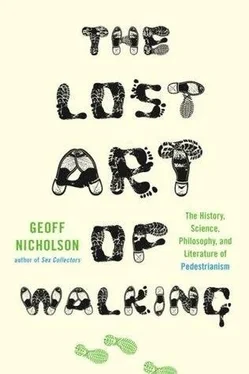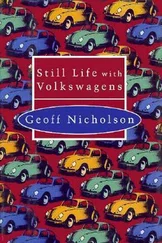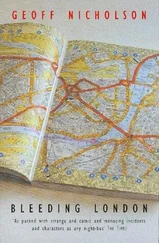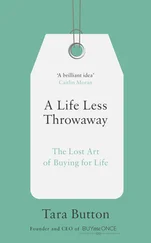The fact is, to the dismay of anyone who’s ever tried to lose weight, a pound of body fat contains 3,500 calories. In other words, to lose a pound of flesh, you need to walk thirty-five miles. There must be easier ways of doing it. In any case, I don’t walk in order to get or stay fit. If there’s any such thing as a desirable ‘walker’s physique’, I have yet to see it.
I’ve never walked professionally, though I’ve had jobs that required me to do a fair amount of walking: garbageman, gardener, security man, drone in a department store. Actually, in the last case the walking wasn’t so much work as a way of avoiding work. I was employed by Harrods in London, a vast and labyrinthine, multifloored department store, ripe for exploration. I discovered, as many had before me, that a man who displayed a false sense of purpose and held a piece of paper in his hand could wander just about anywhere in the place and everybody would always assume he was going about his proper business.
And so at Harrods I walked constantly, relentlessly, through airless, air-conditioned departments, up and down escalators and staircases, moving just purposefully enough to avoid giving the impression that I was loafing. I circulated through the pet department, ate samples in the food hall, went to the musical instrument department, where I admired the grand pianos. I investigated book and record departments, checked out men’s suits. Sometimes I lurked in the electronics department and watched TV; on the odd occasion I even found myself in the bridal department admiring empire bodices and taffeta trains.
And although I wasn’t being paid to walk, I did earn money while I was doing it, in the sense that I earned the same amount of money whether I was doing anything useful or not. Since I hated the job so much, every moment that I wasn’t doing what I was supposed to be doing became a victory — a modest victory to be sure, but I took my satisfactions where I could find them. When I eventually returned to my own desk after what might have been an hour-long walking expedition, it was rare for anyone in the office to notice I’d even been away, although one Australian colleague did regularly accuse me of ‘going walkabout’.
The word walking looks and sounds like a simple, honest, straightforward one, and in some ways it is. The dictionary tells us it has its origin in late Middle English, and therefore doesn’t need a Greek or Latin precursor. Latin terms such as ambulare or pedibus ire seem needlessly fancy — the classical Greek peripateo, stoicbeo , or erchomai are just downright unfamiliar.
Yet perhaps that very simplicity in English is why we need so many qualifiers, so many synonyms, or not quite synonyms, for walking, each word with its own shade and delineation of meaning. I found it revealing to see which of these words applied to my own walking and which didn’t. Tell me how you walk and I’ll tell you who you are.
For example, I’ve performed all the slack, idle, casual, purposeless forms of walking. I’ve strolled and wandered, pottered and tottered, dawdled and shuffled, mooched and sauntered and meandered.
I’ve certainly ambled, and I could be said to have rambled (though the British Ramblers’ Association is made up of hale, out-doorsy hearties who would probably spit on my walking efforts and dismiss them as trifling), and probably I’ve also shambled, but I don’t think I’ve ever gamboled.
I’ve definitely hiked, or at least I’ve definitely been on paths that call themselves hiking trails, but hiking conjures up a degree of seriousness, organization, and specialized clothing that I never quite trust. One of the minor but profound satisfactions of being on a grand, well-known hiking trail is to swan along in shorts, sneakers, and a T-shirt, and to encounter others who are dressed as though for an assault on Annapurna. By the same token I’ve also trekked.
I’ve trudged, tramped, and slogged, and in New York I’ve certainly schlepped. As I say, I’ve never marched in any military or quasi-military sense. Incidentally, the phrase ‘Bolivian marching powder’ as a euphemism for cocaine, much popularized by the literary firm of Mclnerney and Ellis in the 1980 s, turns out to have a much earlier origin. In the First World War, British soldiers were given cocaine-based tablets, known as ‘forced march tablets’, though I’d have thought all marching is forced — the soldiers wouldn’t be doing it if they hadn’t been ordered to.
At the time of the Falklands War, the people of England heard a lot about British soldiers ‘yomping’ to Port Stanley. It’s unwise for a civilian to offer a hard-and-fast opinion on army slang, but I believe yomping involves crossing rough terrain carrying a full pack, and is similar to, but significantly different from, ‘tabbing’. Marines yomp — paratroopers tab, which according to some sources stands for ‘tactical advance to battle’. Tabbing is about speed — yomping is about distance. Unless you’ve been a British soldier it would be unwise to claim to have done either.
A couple of times when suffering from tendonitis or bursitis (walkers’ complaints) I’ve limped and hobbled. I’ve waded, which is walking in, though not on, water. I’ve occasionally, metaphorically, walked on air, and I have probably, again not literally, sometimes walked a tightrope and walked on eggshells. Apparently when I was a child I sleepwalked a few times, but I have no memory of it. When I was a would-be playwright we did walk-throughs of my plays. Occasionally I’ve been given my walking papers. I have never, Byronically, walked in beauty like the night.
I have certainly drifted. However, that’s a word that contains one highly specialized meaning, coming from the French founders and followers of psychogeography, who speak of the derive , which translates as drift, both noun and verb. Psychogeography, as a word, and sometimes as a practice, looms large over the contemporary, literary walker, including me. It was the brainchild of a Frenchman, Guy Debord, who defined it in 1955 as ‘the study of the precise laws and specific effects of the geographical environment’. He and his fellow psychogeographers liked to think of themselves as flaneurs: urban and urbane, disciples of Baudelaire, bohemian dandies who walked around the city observing cool stuff, often stoned. There will be much more of this later, but essentially we’re back in the realm of sensory derangement and heightened sensibility, a condition that may cause a man to stagger, roll, barrel, career, or careen. I’ve walked in some of these ways — maybe I’ve even floated. The extent to which this actually makes me, or anyone else, a flaneur is debatable.
I don’t think I’ve ever cruised. I’m not sure that cruising is a thing a heterosexual man can do. I’m equally sure I’ve never trolled or minced. Edmund White tells us that whereas in English the word cruise is an exclusively gay term, the equivalent French word drageur is also heterosexual. ‘Straight people cruise one another in Paris’, he writes, in a book called, tellingly, The Flaneur , ‘unlike Americans, who feel menaced or insulted by looks on the street’. Ah, those poor, sensitive Americans.
There is, undoubtedly, a sexual component to walking. Actually having real sex while walking, that’s just about impossible, but some people are very sexy when they walk, and a great many more people think about sex as they walk. In the days when I had a real job and a real place of work, I’d live for the lunch hour, when I could get out and walk the streets and look at all the women who were also walking the streets on their lunch hour. We’re talking about the male gaze here, a dangerously ubiquitous phenomenon apparently, and one immortalized in the Frank Loesser song ‘Standing on the Corner’:
Читать дальше












